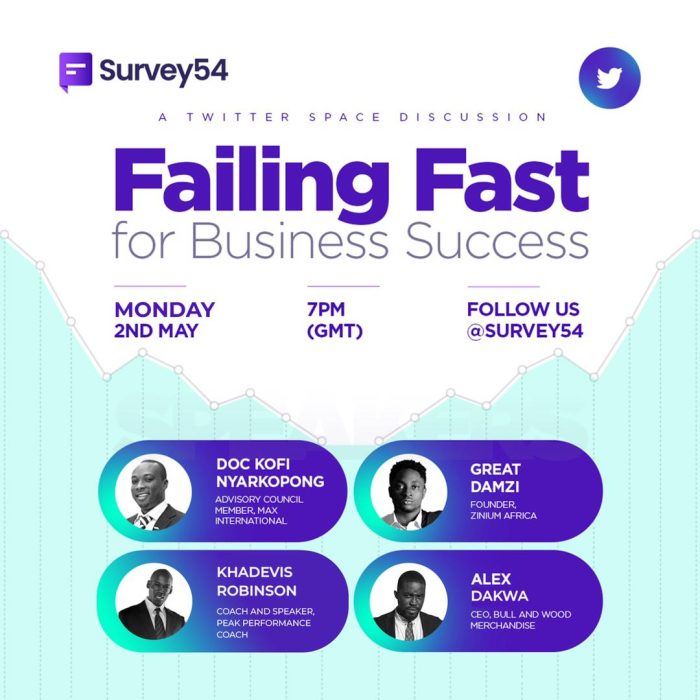Failing fast in business is an experience every entrepreneur has to pass through. A great deal of uncertainty exists in the business ecosystem. Many businesses, even those that appear to be doing well publicly, have their fair share of tough times.

A company’s ability to bounce back from setbacks is what separates the successful ones from the failing ones. No two businesses are the same, so while one business crumbles from the pressure, another grows from it.
On our last Twitter space conversation “Failing fast for business success”, we invited some industry professionals to discuss how to fail fast and fail forward.
Dr Kofi Nyarkopong (Advisory Council Member, Max Int’l), Great Damzi (Founder, Zinium Africa), Khadevis Robinson (Coach & Speaker, Peak Performance Coach), and Alex Dakwa (CEO, Bull & Wood Merchandise) were the speakers at the Twitter space event.
Listen to the conversation playback here.
We’ve broken down some of the vital issues discussed in this article:
1. What is failing fast in business?
- Great defined failing fast as an approach to building and developing products/services that involve rapid testing and experimentation.
- The purpose of failing quickly is to learn quickly, make moves, make mistakes, learn, and apply your lessons so success is the result of learning from your mistakes.
- Failing fast embodies accepting failure, seeing it as a process to success and not as a bad thing. That way, you can make it work for you.
- On his part, Dr Kofi believes that the principle of iteration is critical to failing fast – repeating a process to produce a series of results. Extensive testing is required to determine which hypothesis works and which does not.
- Alex identified failing fast as an approach for determining how long businesses and products can withstand the test of time. It is an approach for testing something new and receiving immediate feedback.
2. How can business owners hack using failure to leverage for success?
- Great believes that when failing, businesses should have a clear goal. Entrepreneurs should also be wary of the ‘shiny object syndrome.’ This is where they have a seemingly brilliant idea and become obsessed with it, without paying attention to what the market really needs.
- Before testing the hypothesis, there should be a clear result because the tests may not get the desired results. Business leaders have to be vigilant to avoid being caught off guard and to save the enterprise from collapsing during the learning process.
Startups need to be prepared to fail fast and fail forward.
- Alex asserts that failure is not a business’ adversary. Instead, it is necessary for corporate expansion. Failing fast and uncovering all the flaws in your business/market niche provides you with an advantage over your competitors. Experience gives startup-preneurs an advantage over the competition who hasn’t attempted a move.
- Dr Kofi concurred with both speakers, saying that if you want to use failure to propel you to success, there are some essential things you must get right. Two of them are:
i. You must rethink your perception of failure. If you consider failure to be the end of the road, you have sealed your own and your company’s fate. Typically, businesses are formed on failure. To succeed, you must build a culture that values risks and failure as opportunities for growth.
ii. Develop a learning culture rather than a blame game. When you go through your iteration process, testing hypotheses, and the results are unpleasant, make use of the opportunity to learn rather than pointing fingers—focusing on who is to blame may obscure your capacity to uncover learning points.
- Failure is also an opportunity to identify and address your strengths and weaknesses. Don’t miss that opportunity.
3. What are some of the practical ways to plan to succeed rather than fail?
- Great advises entrepreneurs to understand that failure cannot be avoided. It is critical to view failure as a gateway to new opportunities.
- Failure is not always the opposite of success. It’s not like a coin where failure is on one side and success is on the other. Failure is important to obtain the necessary feedback for success.
- This feedback could come from investors, partners, employees, the market as a whole, and so on.
Don’t try to avoid failure: anticipate it, prepare for it, embrace it when it comes and learn from it.
- Alex expanded on the famous “failure to plan is planning to fail” quote with these 3 simple strategies:
a. Keep track of your successes and failures. Make a note of them for future reference.
b. Increase your focus on the success indicators you’ve found. Do more of what has previously brought you success.
c. Avoid the things that have caused failure in the past.
- Dr Kofi also encouraged entrepreneurs to seek assistance when they need it.
4. When is the right time to pivot your product/business?
Alex’s perspective:
- This depends on the product and market niche. It may take a long time for some products/businesses and less for others.
- Entrepreneurs should be the first to point out flaws in their own products or services. When you critically evaluate your products, you put yourself in the shoes of your clients, recognizing that they, not you or your team members, are paying for the product.
According to Great;
- Look for Product-Market fit when pivoting. If your product does not meet market demand, you must pivot. If you make pivot decisions based on anything other than product-market fit, you are just making decisions based on your gut instincts and assumptions, which is not a bad concept but is not the greatest method to go about such a decision.
- Pivoting should be growth-driven, data-driven, and influenced by the proper market data, rather than emotionally compelled.
- When you fail, ensure that you fail forward. Fail in progress and not in retrogression. Always guarantee that your failures result from continually innovating and experimenting rather than a failure to innovate. That is how you go forward after failing.
Finally, Dr. Kofi cautioned entrepreneurs not to let perfection become the enemy of productivity.
Don’t wait until you’ve dotted all the I’s and crossed all the T’s before launching your business/products/services. Accept failure as a necessary part of the process. There is no shame in the struggle. The disgrace comes when you give up.
Safiyo by Survey54 will enable your business to fail forward
From this week’s episode of our Twitter space, it is clear that a lack of reliable data is the foundation of business failure.
Safiyo by Survey54 is an AI-powered self-serve dashboard that provides objective market research data so you can analyze your potential market audience and understand long-term consumer behaviour.
Simply log in to get started on Safiyo.











